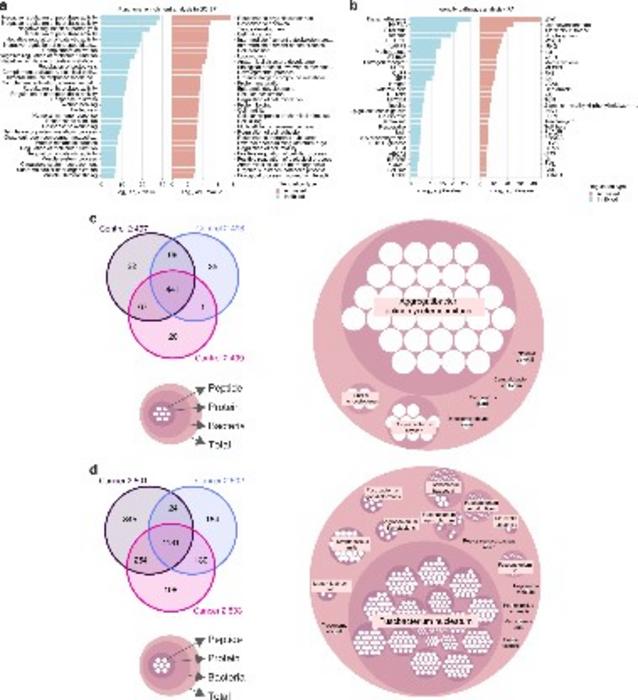
Recent advances in cancer research have illuminated the complex interplay between the oral microbiome and oral squamous cell carcinoma (OSCC). A groundbreaking study set to be published in the International Journal of Oral Science unveils the pivotal role that the bacterium Fusobacterium nucleatum plays in the development and progression of this aggressive form of oral cancer. With the prevalence of OSCC rising alarmingly, understanding the contributions of the oral microbiota has become a pressing concern for researchers and clinicians alike.
The research team, hailing from the Universidad de Concepción in Chile, embarked on an ambitious project to explore the computational proteomic landscape of oral cancer. Their study is particularly noteworthy as it is among the first to comprehensively analyze the interactions between oral bacteria and host cells in the context of OSCC. By leveraging state-of-the-art proteomic techniques, the researchers aimed to identify metabolic pathways that could serve as potential targets for innovative therapeutic strategies. This endeavor not only deepens our understanding of OSCC but also paves the way for enhanced treatment modalities that could improve patient survival rates.
Fusobacterium nucleatum, a common resident of the oral cavity, has garnered attention in recent years for its association with various oral diseases, including periodontal disease. The current study expands on this knowledge by revealing how this bacterium may contribute to the onset of OSCC. The researchers discovered that F. nucleatum’s presence significantly alters the metabolic profile of host cells, promoting tumor growth through a series of specific biochemical interactions. Such insights highlight the bacterium’s potential as a facilitator of cancer progression, establishing a link between microbial dysbiosis and malignancy.
In this study, the researchers conducted a meticulous proteomic analysis, comparing the secretome of OSCC patients with that of healthy controls. The findings were remarkable, revealing significant upregulation of proteins associated with the immune response, cell migration, and amino acid metabolism in cancerous samples. Notably, F. nucleatum was found to be abundant within OSCC tissues, indicating its active involvement in the cancerous environment. These revelations only scratch the surface of how the oral microbiome could influence tumor development, showcasing the urgent need for further investigaciones into host-microbe interactions.
One of the more compelling aspects of the study is its focus on specific metabolic pathways altered by F. nucleatum. The bacterium was shown to facilitate the conversion of L-glutamate to butyrate, a metabolite that has been linked with cancer cell proliferation. Moreover, it was involved in modulating the cystine/glutamate antiporter, enhancing the transport of these amino acids in a manner conducive to promoting epithelial-mesenchymal transition (EMT). This process is critical for the invasion and metastasis of cancer cells, establishing a direct link between microbial activity and the progression of OSCC.
The implications of these findings are vast. As Dr. Estefanía Nova-Lamperti, the lead researcher, pointed out, understanding the intricate interactions between oral bacteria and cancer cells is paramount for advancing cancer treatment approaches. This study not only highlights the role of F. nucleatum in OSCC progression but also opens new avenues for targeted therapies. By focusing on the specific metabolic pathways that F. nucleatum influences, researchers may now be able to develop strategies to inhibit cancer progression, potentially improving outcomes for patients afflicted with this dreadful disease.
Moreover, the research underscores the significance of maintaining oral hygiene to prevent dysbiosis—the imbalance of microbial communities in the mouth, which can lead to health complications, including cancer. This suggests a dual approach in combating OSCC: enhancing oral health practices while simultaneously developing targeted therapeutic interventions. Such a strategy could serve as a holistic framework in managing not only OSCC but also other forms of cancer influenced by microbial factors.
As we look ahead, this study sets the stage for further exploration of how the oral microbiome affects other cancers. For instance, understanding whether similar mechanisms are at play in other malignancies could transform our approach to cancer treatment on a broader scale. The knowledge gleaned from studies such as this serves as a reminder of the complexity of cancer and the multifaceted nature of its causative factors.
In conclusion, the research conducted by the Universidad de Concepción represents a significant leap forward in our understanding of the intersection between microbiology and oncology. The findings illuminate the vital connections between the oral microbiome and cancer progression, urging the scientific community to consider microbiome factors while developing future treatment strategies. This study not only enriches our understanding of OSCC but also underscores the need for an integrative approach to cancer research and treatment. As ongoing investigations shed light on the ways bacteria influence human health, the path to innovative therapeutic interventions becomes ever clearer.
The forthcoming publication of this research promises to resonate widely within the medical and scientific communities, potentially captivating the public’s interest as well. As we process this groundbreaking information, one can only imagine the transformative impact it may have on how we approach cancer treatment and prevention in the years to come.
Subject of Research: Oral squamous cell carcinoma (OSCC) and its connection to oral microbiome interactions.
Article Title: Host-microbe computational proteomic landscape in oral cancer revealed key functional and metabolic pathways between Fusobacterium nucleatum and cancer progression.
News Publication Date: January 2, 2025.
Web References: International Journal of Oral Science.
References: DOI: 10.1038/s41368-024-00326-8.
Image Credits: International Journal of Oral Science.
Keywords: Oral cancer, Fusobacterium nucleatum, OSCC, microbiome, proteomics, cancer progression, therapeutic targets.





